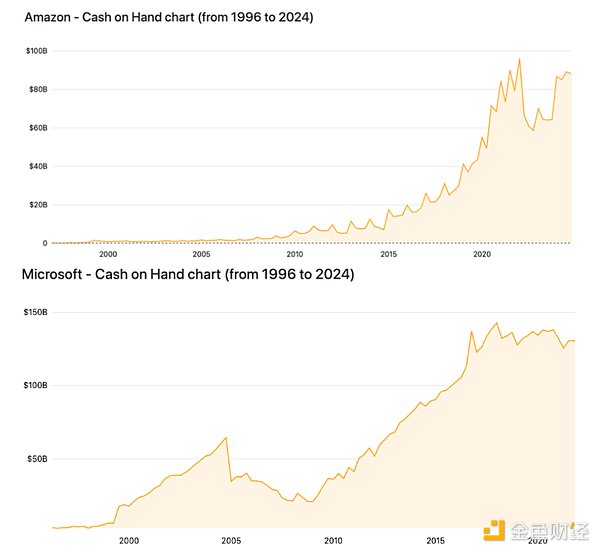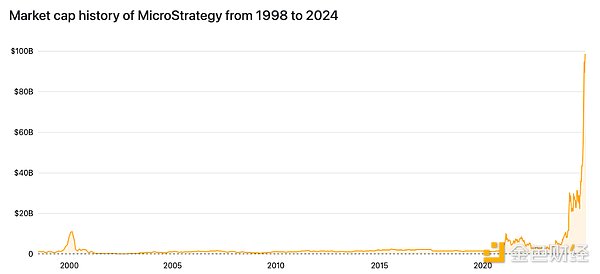Original title: "Why tech giants like Amazon may hesitate to adopt Bitcoin" Written by: DANIEL RAMIREZ-ESCUDERO Translated by: Lawrence, Mars Finance Large technology companies have a lot of cash flow on hand. Currency depreciation has caused them to lose purchasing power. Is Bitcoin a financial solution to fight inflation? Amazon is the next to decide. Large technology companies such as Amazon have a lot of cash on hand ($87 billion last year), but as the currency depreciates, the purchasing power of this cash is declining.
The National Center for Public Policy Research (NCPPR), a Washington, D.C.-based think tank, has submitted a proposal to shareholders to adopt Bitcoin as a solution. However, it is unclear whether the tech giant will benefit from it.
NCPPR has been pursuing this strategy at Microsoft and Amazon. In both companies, the think tank believes that including Bitcoin in its funds will protect cash assets and shareholder value from inflation.
The proposal argues that the Consumer Price Index (CPI) holds inflation at 4.95%, an "extremely poor indicator" of real currency depreciation, and suggests that the actual inflation rate may be twice that figure.

Microsoft and Amazon's cash reserves from 1996 to 2024. Source: Companiesmarketcap
Microsoft has $78 billion in cash on hand, while Amazon has $87 billion. While Bitcoin could offer a potential hedge, do the risks outweigh the benefits?
Despite support from orange pill expert and business intelligence company MicroStrategy chairman Michael Saylor, Microsoft shareholders overwhelmingly voted down the NCPPR’s Bitcoin reserve proposal, indicating that its alleged volatility is a negative factor.
Next up is Amazon. Will this vote be different?
Amazon isn’t as conservative a tech company as Microsoft
Microsoft and Amazon may have similarities as tech giants, but their styles are very different, Nick Cowan, CEO of fintech company Valereum, told Cointelegraph.
“Due to Amazon’s reputation for innovation and risk tolerance, its shareholders may indeed vote differently than Microsoft.”
While Microsoft has historically been more conservative in its fiscal and strategic approach, Amazon has a strong track record of adopting emerging technologies and exploring new investments.
“Unlike Microsoft, Amazon’s higher willingness to innovate may align with the diversification potential of Bitcoin,” Cowan said.
Amazon may vote on the NCPPR proposal at its annual shareholder meeting in May 2025. The proposal urges the company to allocate more than the typical 1-2% of its portfolio to risky assets.
“Amazon should at least evaluate the benefits of holding a portion of its assets in Bitcoin, even as little as 5%.”
Cowan believes that this proportion is unlikely to be achieved. "A 5% allocation to Bitcoin is ambitious and likely unrealistic for a company the size of Amazon," he said. "While Bitcoin provides diversification, its volatility and lack of tangible gains make it difficult to justify at such levels." He believes that "a smaller, experimental allocation similar to Tesla's approach may gain more shareholder support."
Tesla's purchase of Bitcoin in 2021 has resulted in significant profits for the company. Tesla initially purchased $1.5 billion worth of Bitcoin, but sold 70% of its initial holdings in 2021.
Nevertheless, Tesla still holds its Bitcoin reserves (9,720 BTC), which are valued at more than $1.3 billion, according to BitcoinTreasuries.NET.
Amazon has billions of dollars in cash, so it could easily allocate a similar amount to Tesla.
While the NCPPR may sincerely want Amazon and Microsoft to adopt Bitcoin, Cowen believes that the broader strategy is to amplify the message that Bitcoin can be seen as an inflation hedge to "create potential momentum for institutional adoption of Bitcoin."
The NCPPR did not immediately respond to Cointelegraph's request for comment.
Do Tech Giants Need Bitcoin to Fill Their Wealth?
MicroStrategy has made significant progress in its efforts to incorporate Bitcoin into its financial core strategy.
The company began buying Bitcoin on August 11, 2020, acquiring 21,454 BTC for $250 million. Since then, its share price has soared from $14 to $411, and its market value has risen from $1.3 billion to nearly $100 billion.
Michael Saylor's bet on Bitcoin as a hedge against inflation has far exceeded expectations, so why don't tech giants follow Saylor's financial model?
However, MicroStrategy's approach is significantly different, using a lot of leverage, making its strategy much riskier than Tesla's buy-and-hold strategy.

MicroStrategy's market value history from 1998 to 2024. Source: Companiesmarketcap
In addition, the ratio of Bitcoin to its total market cap turns its stocks into leveraged Bitcoin proxies.
According to the article, Amazon has a market cap of $2.4 trillion and Microsoft has a market cap of $3.3 trillion, so its Bitcoin adoption effect will not be similar to MicroStrategy.
Cowen believes that Amazon is not in a hurry to adopt Bitcoin because its "core business is strong." While reallocating some or all of its cash reserves into Bitcoin could be a hedge against inflation, there are risks in deviating from the current financial strategy, which some shareholders may see as a potential burden on its profitable business model.
“The opportunity cost of holding a volatile asset like Bitcoin instead of investing in R&D or acquisitions would weigh heavily in a decision like this.”
“Keeping a large portion of funds in Bitcoin could impact Amazon’s ability to fund key growth areas like AWS, AI development, and logistics infrastructure,” he said. Shareholder voting decisions will need to “strike a balance between speculative asset acquisitions and investments in key innovations that will determine Amazon’s competitive advantage.”
Bitcoin environmental issues could hold back shareholders
Big tech companies must also consider public perception, as mainstream media has a large influence on their brands and stock prices. While Bitcoin’s reputation has improved significantly, it is still associated with speculative trading assets, potential for abuse, and environmental issues.
“A negative PR narrative could obscure potential economic benefits, especially given Amazon’s focus on ESG initiatives and its need to remain broadly appealing to stakeholders.”
Amazon revolutionized commerce by enabling fast delivery of goods to doorsteps. However, the model has an alarming impact on the environment, generating more than 709 million pounds of plastic waste, according to a 2022 report by environmental group Oceana.
The company has pledged to achieve net-zero carbon emissions by 2040, a decade ahead of the goals of the Paris Agreement.
Bitcoin mining has been heavily criticized by environmentalists for its high energy consumption. However, that narrative is changing as mining infrastructure comes under more thorough scrutiny. Despite this shift, the risk of a PR backlash remains.
Amazon shareholders must decide whether the company can achieve positive results similar to those of Tesla or MicroStrategy by using Bitcoin to hedge against inflation, or whether it should avoid risk and focus on its core business model.
 Joy
Joy






